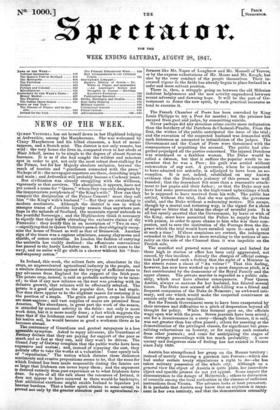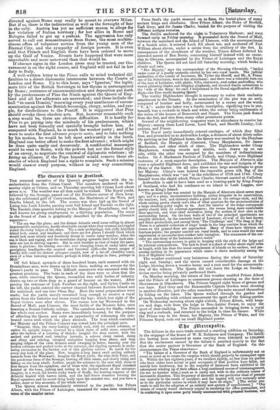Austria has strengthened her grasp on the Roman territory :
instead of merely throwing a garrison into Ferrara—which she had under certain treaty stipulations a right to do—she has taken military possession of the whole city. Although on a general view the object of Austria is quite plain, her immediate object and specific pretext do not yet appear. Some impute the demonstration to the dotage of Metternich ; others to distraction of councils among the local authorities in the absence of sufficient instructions from Vienna. The advance looks at least premature. It is probable that Austria may know that an explosion is immi- nent in her own territory, and that the demonstration ostensibly
directed against Rome may really be meant to overawe Milan. But if so, there is the indiscretion as well as the foresight of fear in the sally. Austria has yet no sufficient reason to allege for her violation of Italian territory ; for her allies in Rome and Bologna failed to get up a pretext. The aggression has only served to call out remonstrances from Rome, the moat multitu- dinous offers of volunteer service from the young men of the Eternal City, and the sympathy of foreign powers. It is even said that French and English fleets have been ordered to move up the Gulf of Venice. Events have happened that were more improbable and more untoward than that would be.
If obscure signs in the London press may be trusted, our Go- vernment is on the right course, and England will not fail in her duty to Italy.
A well-written letter to the Times calls to mind technical dif- ficulties to a direct diplomatic intercourse between the Courts of London and Rome. Up to this hour, says " Ignotus," the legiti- mate title of the British Sovereign to her throne is unrecognized by Rome; sentences of excommunication and deposition put forth by the predecessors of Pius the Ninth against the Queen of Eng- land and all her adherents are unrevoked; and these include the bull "in clunk Domini," renewing every year anathemas of excom- munication against the British Sovereign, clergy, nobles, and peo- ple, for disobedience to the Pontiff. It is suggested that Pius should revoke these obsolete acts. But, however reasonable such a step would be, there are obvious difficulties. It is hardly for Pius to go prying into the misdeeds of his predecessors, which have not been formally and specially brought before him. As compared with England, he is much the weaker party ; and if he were to make the first advance proprio motes, and to take nothing by his motion, he would be left most awkwardly in the lurch. England can better afford to make the first advance ; which might be done quite easily and decorously. A confidential messenger could be sent to Rome, with the powers but not the formal style of an envoy, to negotiate the renewal of diplomatic relations ; of- fering an alliance, if the Pope himself would remove those ob- stacles of which England has a right to complain. Such a mission would answer every purpose, without in any way committing England.



























